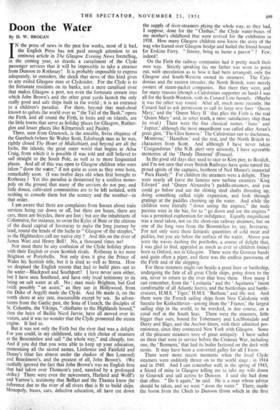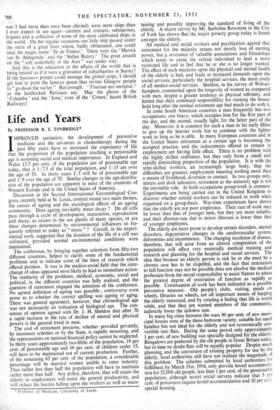Doon the Water
IN the press of news in the past few weeks, most of it bad, the English Press has not paid enough attention to an ominous article in The Glasgow Evening News foretelling, in the coming year, so drastic a curtailment of the Clyde passenger services that it will be impossible to take a steamer from Dunoon to Rothesay! It is probably impossible to express adequately, to outsiders, the shock that news of this kind gives to any exiled Glasgow man or Clydesider. For the Clyde is to the fortunate residents on its banks, not a mere canalised river that makes Glasgow a port, not even the fortunate stream into which John Brown's and the other great yards launch the only really good and safe ships built in the world ; it is an entrance to a children's paradise. For there, beyond that mud-shoal known to sailors the world over as " the Tail of the Bank," opens the Firth, and all round the Firth, in lochs and on islands, are the little. towns that serve as holiday places for Glasgow, Ruther- glen and lesser places like Kilmarnock and Paisley.
There, seen from Greenock, is the amiable, Swiss elegance of the Gareloch (where Sir Walter Scott, Edinburgh man as he was, rightly closed The Heart of Midlothian), and beyond are all the lochs, the islands, the great outer world that begins at Ailsa Craig, from which it is possible (I was told and still believe) to sail straight to the South Pole, as well as to more frequented places. And all of this was open to Glasgow children who were taken ," doon the water," if not quite as soon as they were born, remarkably soon. (I was twelve days old when first brought to Rothesay.) Yet this paradise is threatened by a soulless mono- poly on the ground that many of the services do not pay, and little douce, cultivated communities are to be left isolated, with nothing to console them but the scenery and the weather—in that order.
I am aware that there are complaints from Sussex about train services being cut down or off, but there are buses, there are cars, there are bicycles, there are feet ; but are the inhabitants of Colintraive, for instance, to swim the Kyles of Bute or the citizens of the ducal capital of Inveraray to make the long journey by land, round the heads of the lochs to " Glasgow of the steeples," as the Highlanders call my native city ? And this on the river of James Watt and Henry Bell! No, a thousand times no!
Nor must there be any confusion of the Clyde holiday places with their English or even Scottish rivals. Rothesay is no mere Brighton or Portobello. Not only does it give the Prince of Wales his Scottish title, but it is sited as well as Stresa. How we despised the English resorts that had to build piers out to the water—Blackpool and Southport! I have never seen either, but I have seen Southend, and have only local testimony to its being on- salt water at all. No ; man made 'Brighton, but God (with possibly " an assist," as they say in Hollywood, from the Duke of Argyll) made the Clyde. And He made it, on the north shore at any rate, inaccessible except by sea. So adven- turers from the Gaelic past, the Sons of Usnach, the disciples of St. Columba, the Vikings, " chieftains to the Highlands bound," then the heirs of Baillie Nicol Jarvie, have all moved over its waters, and it was no wonder-that the Clyde pioneered the steam engine. It had to.
But it was not only the Firth but the river that was a delight. For you could, in my childhood, take a rich choice of steamers at the Broomielaw and sail " the whole way," and cheaply, too. And if you did that you were able to keep up your education, memorising all the sacred names, Linthouse and Fairfield and Denny's (that lies almost under the shadow of Ben Lomond) and Beardmore's, and the greatest of all, John Brown's. (We tactfully ignored the fact that John Brown's was an English firm that had taken over Thomson's yard, wrecked by a prolonged strike.) There were even the newcomers, Harland and Wolff's and Yarrow's, testimony that Belfast and the Thames knew the deference due to the river of all rivers that is fit to build ships. Monopoly, buses, cars, defective education, all have cut down the supply of river-steamers plying the whole way, as they had, I suppose, done for the " Cluthas," the Clyde water-buses of my mother's childhood that were revived for the exhibition in 1938. How many Glasgow children now know the story of the wag who leaned over Glasgow bridge and hailed the friend bound for Erskine Ferry. "Jimmy, bring us hame a parrot" ? Few, indeed!
On the Firth the railway companies had it pretty much their own way. Strictly speaking (as my father was wont to point out, with speculation as to how it had been arranged). only the Glasgow and South-Western owned its steamers. The Cale- donian and the eastern intruder, the North British, were merely owners of steam-packet companies. But there they were, and for many reasons (though a Caledonian supporter on land) I was all for the South-Western, with its Cunard Line funnels. (Maybe it was the other way round. After all, much more recently, the Cunard had to ask permission to call its large new liner ' Queen Mary,' and the ' Queen Mary II ' that plies the Firth is the real ' Queen Mary' and, in sober truth, a more satisfactory ship than its rival.) There were the fine classical names ' Juno ' and ' Jupiter,' although the most magnificent was called after Arran's great glen, ' The Glen Sannox.' The Caledonian ran to duchesses, ' Montrose," Hamilton ' and the rest, and the North British to characters from Scott. And although I have never taken Craigendoran ' (the N.B. pier) very seriously, I have agreeable memories of the ' Dandy Dinmont' (France).
In the good old days they used to race to Kim pier, to Brodick, and I'm not sure that even British Railways have quite tamed the proud spirits of the captains, brethren of Neil Munro's immortal "Para Handy." For children the steamers were a delight. They were nearly all (save the famous new turbine steamers ' King Edward ' and ' Queen Alexandra ') paddle-steamers, and you could go below and see the shining steel shafts thrusting up, doing something called triple expansion, and look through gratings at the paddles churning up the water. And while the children were literally " down seeing the engines," the male parents were in the bar, for to " go down and see the engines " was a permitted euphemism for indulgence. Equally magnificent was a meal taken, not on the short-run railway steamers, but on one of the long runs from the Broomielaw to, say, Inveraray. For not only were there fantastic quantities of cold meat and pickles, but you ate below the surface of the water. Above you were the waves dashing the portholes, a source of delight that, I was glad to find, appealed as much as ever to children (mine) born in Oxford, not in Glasgow. There were the German bands and quite often a piper, and there was the endless panorama of the Firth and of the shipping. For these steamers might run beside a great liner or battleship, undergoing the fate of all great Clyde ships, going down to the sea, never to return to the river that bore them. How many I can remember, from the Lusitania' and the Aquitania ' (most comfortable of all Atlantic liners), and the battleships and baffle- cruisers, H.M.S. ' Tiger,' H.M.S. ' Barham ' and the rest. And there were the French sailing ships from New Caledonia with bauxite for Kinlochleven—among them the France,' the largest sailing ship in the world, to be wrecked, in due course, on a coral reef in the South Seas. There were the steamers, little bigger than ours, bound for Tobermory and Lochboisdale and Derry and Sligo, and the Anchor liners, with their admitted pre- eminence, since they connected New York with Glasgow. Some of the pleasure steamers were of great antiquity. I have sailed on three that were in service before the Crimean War, including one, the Benmore,' that had its boiler fastened on the deck with struts. It may have been a converted galley for all I know. There were more recent moments when the local Clyde steamers were suddenly thrust on to the world stage ; in 1914 and in 1940. And I can remember well, in the spring of 1943, a friend of mine in Glasgow telling me to take my wife down to Gourock and sail across to Dunoon. I said she had done that often. " Do it again," he said. He is a man whose advice should be taken, and we went " doon the water." There, inside the boom from the Cloch to Dunoon (from which in the first war I had more than once been chivied), were more ships than I: ever expect to see again—carriers and cruisers, submarines, frigates and a collection of some of the most celebrated ships in the world. On her regular occasions our little ship passed under the stern of a great liner where, badly obliterated, one could read the magic name ` lle de France.' There were the Marnix van 'St. Aldegonde ' and the ' Stefan Batory.' The great assault on the " soft underbelly of the Axis " was under way.
And this is the education in the affairs of the world that is being treated as if it were a grievance of suburbanites in Surrey! It the Spectator printer could manage the glottal stops, I should get him to print the famous poem that invites Glasgow people to " go doon the wa'ter." But enough. "Fluctuat nec mergitur," as the landlocked Parisians say; May the ghosts , of the ' Columba ' and the ` Iona,' even of the ` Comet,' haunt British Railways!



































 Previous page
Previous page